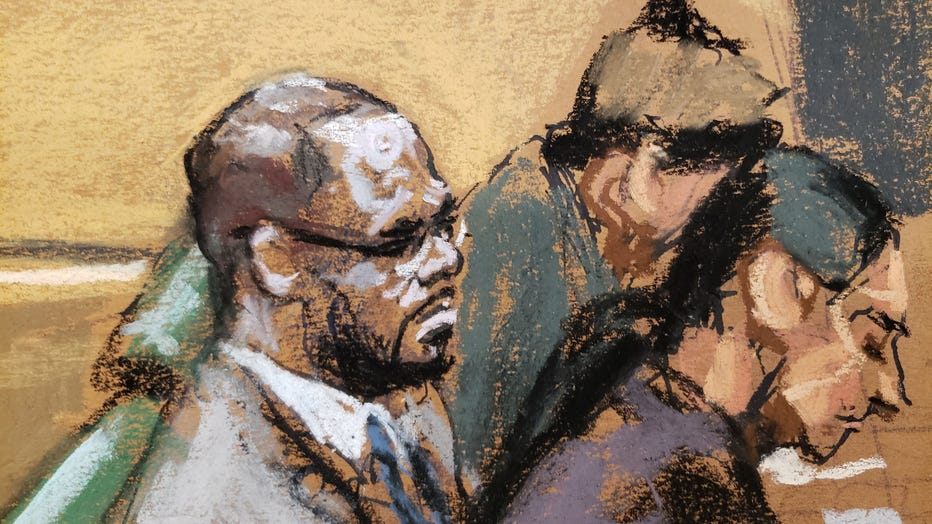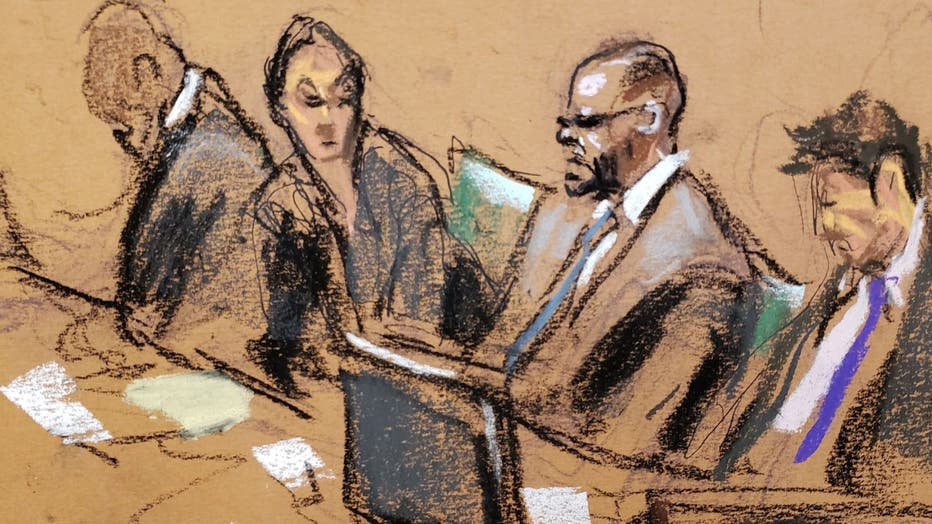R. Kelly described as "predator" in opening statements of sex trafficking trial
NEW YORK - A prosecutor described sex abuse claims against R&B star R. Kelly Wednesday, saying the long-anticipated trial now underway was "about a predator" who used his fame to entice girls, boys and young women before dominating and controlling them physically, sexually and psychologically.
"This case is not about a celebrity who likes to party a lot," Assistant U.S. Attorney Maria Cruz Melendez told the Brooklyn jury as she explained the evidence to be revealed at his federal trial.
"This case is about a predator," she said.
She said he invited children and women to join him after shows by distributing backstage passes.
Once he had them alone, Melendez said, he "dominated and controlled them physically, sexually and psychologically."
The prosecutor said Kelly would often record sex acts with minors as he controlled a racketeering enterprise of individuals who were loyal and devoted to him, eager to "fulfill each and everyone one of the defendant’s wishes and demands."
"What his success and popularity brought him was access, access to girls, boys and young women," she said.
RELATED: R. Kelly sex trafficking trial: What to know and expect
Get breaking news alerts in the FOX5NY News app. Download for FREE!
A lawyer for Kelly was expected to deliver an opening statement after Melendez completed hers.
The openings came more than a decade after Kelly was acquitted in a 2008 child pornography case in Chicago. It was a reprieve that allowed his music career to continue until the #MeToo era caught up with him, emboldening alleged victims to come forward.

The sex trafficking trial against R&B superstar R. Kelly got underway in federal court in downtown Brooklyn. Aug. 18, 2021 (Jane Rosenberg)
The women's stories got wide exposure with the Lifetime documentary "Surviving R. Kelly." The series explored how an entourage of supporters protected Kelly and silenced his victims for decades, foreshadowing a federal racketeering conspiracy case that landed Kelly in jail in 2019.
Sign up for FOX 5 email newsletters

A prosecutor said R&B singer R. Kelly would often record sex acts with minors as he controlled a racketeering enterprise of individuals. (Jane Rosenberg)
Prosecutors in Brooklyn have lined up multiple female accusers — mostly referred to in court as "Jane Does" — and cooperating former associates who have never spoken publicly before about their experiences with Kelly.
They're expected to offer testimony about how Kelly's managers, bodyguards and other employees helped him recruit women and girls — and sometimes boys — for sexual exploitation. They say the group selected victims at concerts and other venues and arranged for them to travel to see Kelly in the New York City area and elsewhere, in violation of the Mann Act, the 1910 law that made it illegal to "transport any woman or girl" across state lines "for any immoral purpose."
RELATED: 'Lurid details' to be presented in R. Kelly sex trial: Prosecutors

R. Kelly pleads not guilty to sexually abusing women, girls
NEW YORK (AP) — Embattled R&B singer R. Kelly pleaded not guilty Friday to federal charges he sexually abused women and girls who attended his concerts as his lawyers continued to label the alleged victims disgruntled "groupies."
When the women and girls arrived at their lodgings, a member of Kelly’s entourage would set down rules about not speaking to each other, how they should dress and how they needed permission from Kelly before eating or going to the bathroom, prosecutors say. Also, they allegedly were required to call him "Daddy."
Defense lawyers have countered by saying Kelly’s alleged victims were groupies who turned up at his shows and made it known they "were dying to be with him." The women only started accusing him of abuse years later when public sentiment shifted against him, they said.
RELATED: Jury selection begins in R&B singer R. Kelly's sex trafficking trial

Feds bring new sex crimes charges against singer R. Kelly
CHICAGO (AP) — R. Kelly appeared in court Friday to face new federal charges that accuse him and members of his entourage of recruiting women and girls to engage in illegal sexual activity with the singer and paying them to cover up his crimes.
Kelly, 54, is perhaps best known for his smash hit "I Believe I Can Fly," a 1996 song that became an inspirational anthem played at school graduations, weddings, advertisements and elsewhere.
An anonymous jury made up of seven men and five women was sworn in to hear the case. The trial, coming after several delays due mostly to the pandemic, unfolds under coronavirus precautions restricting the press and the public to overflow courtrooms with video feeds.
The New York case is only part of the legal peril facing the singer, born Robert Sylvester Kelly. He also has pleaded not guilty to sex-related charges in Illinois and Minnesota.


